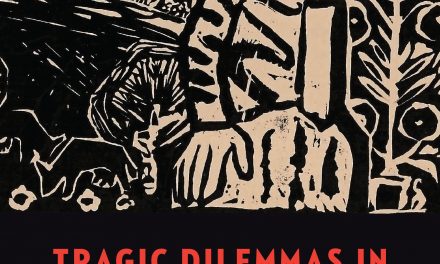This post is co-authored with Thomas M. Hart, O.S.B., Assistant to the President for Mission, Saint Vincent College.
The prayers throughout Lent exhort us to a three-fold practice: prayer, fasting, and works of mercy. We generally like to step up to the challenge on the first and the third, but not so much on the second. Why is that?
Fasting today is almost always thought of as a burden, something imposed. With its almost total demise in the Church, many people would be inclined to say: “Who in his right mind would say, like the sixth century Saint Benedict, ‘Love fasting’?” The indictment extends even to religious orders, where one can scarcely even have a rational conversation on fasting without being laughed out of court.
Yet the early Christians said we should love fasting. If the Didache is any guide, fasting was an essential and integral ingredient in a Christian’s regimen. The prominent fast was prior to one’s baptism (not just the one to be baptized, but also for the one who baptizes). Thereafter, fasting was to be a regular weekly feature every Wednesday and Friday. Most importantly, Christians were to fast for those persecuting them. Is it possible to imagine how our civic and public debates would be elevated if we were to do the same? Closer to home, what if we fasted for someone with whom we are not reconciled?
The ancient Lenten fasting was more extreme. To get a sense of it, Philip Jenkins argues we should look at Ramadan:
Muslims today have a month-long-season called Ramadan that looks quite ferocious to most Christians. Between the hours of dawn and dusk, Muslims can eat or drink absolutely nothing. This is very demanding in a hot climate, and in 2013, Ramadan falls in July. They take this fasting very seriously indeed. Christians looking at that example may wonder where on earth Muslims got this bizarre idea, but the answer is simple. When Islam arose in the seventh century, members of the new faith just took over the older Christian practice of Lent. In those times, the Christian Lent did not mean anything as simple as giving up chocolate or luxuries. It meant really demanding fasting, exactly like the modern Ramadan, a scale of self-denial that seems unimaginable to most Western believers today.
Despite our contemporary retreat from such fasting, so many of the people we revere saw it as essential.
- Saint Benedict, the man who wrote as, “a father who loves you; . . . who lays down nothing harsh, nothing burdensome” and whose Rule is the foundation of countless religious orders, said “love fasting.”
- In To Love Fasting, Adalbert de Vogüé writes about “the fearful moral power” of Gandhi’s fasts which opened people’s eyes to systemic evil.
- Servant of God Dorothy Day used the spiritual weapons of prayer and fasting to serve the poor. Her fasts of three, five, and ten days helped her to courageously oppose our military-industrial complex’s addiction to violence and war.
- For Cesar Chavez, who is praised in the United States Catholic Catechism for Adults, fasting was central to his vocation, first for the purification of his own motives, and then for those in positions of authority who contributed to social evils whether by malice or complicity. If Chavez could fast anywhere from twenty-four to thirty-six days, who can say that we are any weaker?
- The Camaldolese, an order of hermit monks professing the Rule of Saint Benedict, have never let the monastic custom of fasting lapse all these centuries, and have intentionally kept it as a living practice.
From these examples, it is clear that fasting is not starvation but an opportunity to experience the power of God in a deeper way. It helps us confront our failures, approach the failures of others with a spirit of charity and reconciliation, and overcome evil that causes suffering. Why do we resist fasting? Why do we view it as a juridical obligation done twice a year? If we came to “love fasting,” might we discover a deeper desire for God, and find the surprising ability to love our neighbors (and enemies!) better than we ever knew we could?
So in our time then, why not consider reintegrating the ancient three-fold character of Lenten observance? Saint Peter Chrysologus (ca. AD 430) said it best: “Fasting is the soul of prayer, mercy is the lifeblood of fasting. Let no one try to separate them; they cannot be separated. If you have only one of them or not all together, you have nothing.”




I think the reason we resist fasting is that it’s so lonely. In a society that doesn’t fast (but does diet), the ability to fast depends almost entirely upon one’s willpower. There is no community support. It wasn’t that long ago (1965) that American Catholics did fast through the season of Lent (the Catholic fast, that is, not the more demanding Muslim or Jewish version). It worked because they did it together. It was “social penance” supported by the community, and I would suggest that’s why it worked in the early Church and among so many religious communities as well. Once it becomes individual in nature it can become more self-focused, and even a cause for pride. Fasting needs to be something we do together.
Jason– I’m glad you posted this, because I think it is very challenging. I think Maria is right: the lack of any corporate character to the fast is a problem. But I think there’s more than this: I don’t think we have a good understanding of how any kinds of practices of “unreasonable” asceticism are supposed to “help” us. Prayer and almsgiving seem in tune with the modern imaginary of “getting in touch with yourself” and “being altruistic” – but fasting?? I think that’s why we end up giving up “bad things” for Lent – because that kind of “fast” makes sense in a new-years-resolution sort of way. Giving up too much food might make sense – but fasting??
Let me further admit that I dislike fasting. I am skinny and I eat a lot. What I usually “learn” from fasting is that it must be miserable to be hungry and undernourished all the time (a very modern thing to learn), but I rarely feel like it has the effect of sharpening my spiritual focus or my being attentive to the needs of others when actually fasting.
Yet of course I realize I MUST be missing something here, as Jason’s post explains so well. I think there is definitely a need to recover some kind of “wisdom of renunciation,” and fasting is surely a practice whose logic invites such reflection.
From Tom Hart, OSB: MorrowMC’s comment is magnificent. The communal dimension makes all the difference. Her final two sentences are exactly on target. In regards to one of the hazards that can come from taking up this practice, MorrowMC’s could easily be paraphrasing John Climacus:
Like the sun which shines on all alike, vainglory beams on every occupation. What I mean is this. I fast, and turn vainglorious. I stop fasting so I will draw no attention to myself, and I become vainglorious over my prudence. I dress well or badly and am vainglorious in either case. I talk or I hold my peace, and each time I am defeated. No matter how I shed this prickly thing, a spike remains to stand up against me (Ladder § 22).
This is one reason why I hope the US Bishops take up the question of fast and abstinence again; we need to recover the communal dimension for spiritual support, and to help curb the deadly spiritual pride that can result if it’s only an individual regimen.
The bishops hinted that they would, maybe this fall. Maybe a gentle lobbying effort is called for here, to encourage them to not be afraid to do so. I know Eamon Duffy almost single-handedly persuaded the UK bishops to do so. It would be a hopeful sign if we followed suit. I also think it would assist the healing that needs to take place in our wider Catholic community.
Thanks for your response! I also hope the USCCB revisits the question of fast and abstinence. I would favor a gradual re-introduction of these penitential practices, beginning with year-round Friday meat abstinence (excluding solemnities, of course). Given the “meatless Monday” trend I think it would be apropos.
But I think the trickiest thing with trying to recover the communal dimension is that it basically requires “rules” and “obligations,” which to many people still have negative connotations, and for good reason. We don’t want people fasting and abstaining just because it’s a rule, but because they want to do penance. Hence the reintroduction of such rules would have to come with a heavy dose of new evangelization that would make people want to do penance.
In the meantime, the immediate family or religious community could be one place to start reintroducing a communal dimension to fasting.
Regarding David’s comment, I think for fasting to work spiritually it helps to have an aspiration (or song!) to say/sing whenever you’re really feeling hungry. I always used the praise and worship song that begins “Hungry, I come to you/ for I know you satisfy/ I am empty but I know your love restores my life/ so I wait for you…” The idea is to recognize in that dearth the need for God. Also, the nice thing about Catholic fast is that it’s relative to the person, so maybe even safe for David to do regularly. Also, perhaps with a little more practice, it would get easier? That’s why penance is a virtue. Right now, with only twice a year fasting, it’s no wonder it seems so difficult.